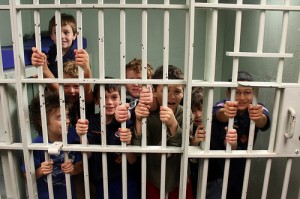
For far too many boys, their first contact with our social support network is via a school suspension.
And for most of these boys, the system provides further assault and insult, not support and healing. (Ever heard of the school-to-prison pipeline?)
Trauma-Informed Care can help.
Trauma-Informed Care has its roots in the Adverse Childhood Experience Study (ACES), conducted by the CDC and Kaiser Permanente. The study measured toxic, traumatic childhood experiences self-disclosed by 17,000 well-educated, mostly Caucasian patients in the San Diego metro area. The ACE Study continues to follow the medical as well as mental outcomes of these participants, who were an average of 57 years old when the study began in the mid-1990’s.
According to the original ACE Study results, the prevalence of childhood trauma among this mostly middle-class population was astounding. A surprising 28% had suffered physical abuse, 22% had experienced sexual abuse, and 11% had endured emotional abuse. A full 23% had not been raised by both biological parents. 27% reported living with an alcohol or drug abuser in the family home.
All that trauma equaled adverse outcomes. The ACE Study has shown that the higher an individual’s ACE Score, the higher the individual’s risk for a host of behavioral, psychological, and physical conditions which affect quality of life. In cases where ACE scores were at six or more (out of ten questions), chances of a shorter lifespan were greater.
Is it any wonder our boys are in trouble?
Unaddressed trauma can cause both adults and children to try to escape their feelings about that trauma in destructive ways (think addictions, mental health issues, inability to regulate emotions, risky maladaptive coping choices). Trauma harms a person’s ability to trust and that lack of trust makes it difficult to reach out for or to accept help. And yet our child welfare, legal and educational systems are all set up so that the system, not the family or child, holds all of the power and control.
Trauma-Informed Systems change that power and control imbalance.
It’s unreasonable to expect traumatized children to trust authorities or to open up when they’re restrained by rigid systemic policies. So some states, including Pennsylvania, are experimenting with a different, more compassionate approach. Pennsylvania is using multidisciplinary teams to help children and families who come before judicial courts. Child & Youth Services , State Police officials, child advocates and District Attorney staff sit at the table during every case review. All participants are required to focus on the needs of that particular child, and to aim for the best possible outcome for each child.
The trauma-informed approach is still in its infancy stages, as adult professionals in a wide variety of systemic disciplines learn to set aside their individual goals, approaches, egos and territorial strangleholds to ask themselves, together, “what is in the best interest of this child?”
For families, and our boys, the trauma-informed approach to mitigating the lasting effects of adverse childhood experiences such as child maltreatment, family and neighborhood violence, could have a positive impact on the long-term health & well-being of all those who suffer horrible, preventable personal childhood adversity.
Brenda Yuen is a volunteer childhood trauma prevention advocate living in suburban Washington, DC with her husband and two children, a son, aged 11 and daughter, aged 9. Her own childhood included sexual abuse trauma.






